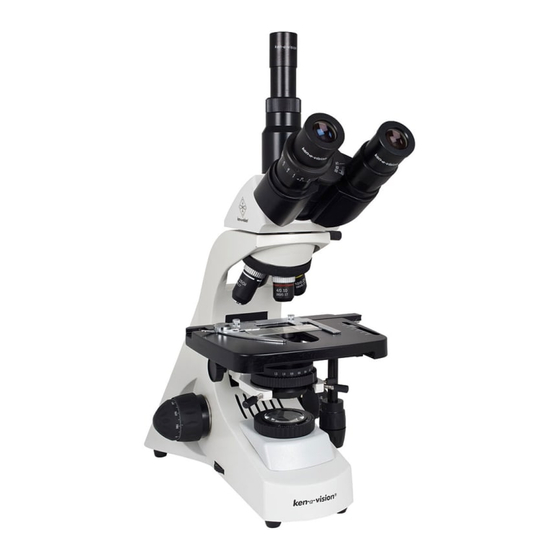Advertisement
Quick Links
Research Scope
Instruction Manual
T-29031 Binocular Acromat Research Scope
T-29041 Trinocular Acromat Research Scope
T-29032 Binocular Semi-Plan Research Scope
T-29042 Trinocular Semi-Plan Research Scope
T-29033 Binocular Acromat Plan Research Scope
T-29043 Trinocular Acromat Plan Research Scope
T-29034 Binocular Infinity Achromat Research Scope
T-29044 Trinocular Infinity Achromat Research Scope
T-29035 Binocular Infinity Semi-Plan Research Scope
T-29045 Trinocular Infinity Semi-Plan Research Scope
T-29036 Binocular Infinity Plan Research Scope
T-29046 Trinocular Infinity Plan Research Scope
Advertisement

Subscribe to Our Youtube Channel
Summary of Contents for Ken A Vision Research Scope T-29041
- Page 1 Research Scope Instruction Manual T-29031 Binocular Acromat Research Scope T-29041 Trinocular Acromat Research Scope T-29032 Binocular Semi-Plan Research Scope T-29042 Trinocular Semi-Plan Research Scope T-29033 Binocular Acromat Plan Research Scope T-29043 Trinocular Acromat Plan Research Scope T-29034 Binocular Infinity Achromat Research Scope...
- Page 3 Its modular design allows for a full range of accessories. It has a modern, ergonomic design with many advanced features so users can operate the instrument conveniently and safely. T-29031 T-29041 T-29032 T-29042 T-29033 T-29043...
- Page 4 T-29034 T-29044 T-29035 T-29045 T-29036 T-29046 Halogen Light 12V 20 W High Bright Köhler Illumination Low Coaxial Fine Focus Scale 0.002mm 30° Inclined Binocular 55mm - 75mm 30° Inclined Trinocular 55mm-75mm Eyepieces - 10X DIN 4X, 10X, 40X, Achomat Achomat Semi-Plan Semi-Plan Plan...
-
Page 5: Operation
OPERATION Illumination: On any light microscope, the ability to adjust light is probably the most import element after the quality of the lens systems. The Ken-A-Vision Research Microscope has 4 distinct mechanisms to adjust light intensity, and thereby allowing for High Bright Köhler Illumination. The degree of light inten- sity needed depends... - Page 6 How to set up your Ken-A-Vision Research Microscope for High Bright Köhler Illumination • Focus on the specimen with whatever objective desired for use. • Close the field diaphragm (located on top of the illuminator in the base) to its most closed position - you may see the edges of the diaphragm within the microscope field (they may be blurry).
-
Page 7: Bulb Replacement
objectives are all spring-loaded so they should slide onto the cover slip WITHOUT any force. If you have to force the objecting into position, STOP , your specimen and/or cover slip may be too thick, and you risk scratching the objective and/or smashing the slide. - Page 8 Useful microscopy definitions and Research Scope options Objective Lenses There are typically three types of objective lenses found on brightfield microscopes - Achromat, semi-plan, and plan objectives. understand the difference, realize that all microscope lenses are curved, which results in an image that is slightly out of focus at the edges, and may produce chromatic or spherical aberrations due to this curved shape.
- Page 9 160 mm established by standard in the 1800's. The infinity optical system provides an "infinite" region of parallel light between objective and eyepiece, pushing the image out approaching infinity Aberrations - Chromatic, Achromatic or Spherical - Any change from idealized and/or uniform light conditions coming through a lens is called an aberration.
-
Page 10: Care And Maintenance
CARE AND MAINTENANCE Cleaning The T-290XX Research Microscopes are precision instruments. Routine or protective care and maintenance is highly recommended. • Always wipe off any (immersion) oil from objectives, stage and condenser immediately. More persistent dirt, such as fingerprints, grease and/or oil, may be removed with soft cotton or lens tissue, lightly moistened with lens cleaner. - Page 11 Accessories If you are interested in purchasing accessories or replacement parts for your Research Scope, visit the Ken-A-Vision Web site, http://store.kenavision.com/ catalog/ or contact your local Ken-A-Vision Dealer.
- Page 12 Ken-A-Vision reserves the right to make design improvements and other changes in accordance with the latest technology. There is no obligation to make changes in products already manufactured. Patents Pending Copyright 2009 Ken-A-Vision Corporation. 5615 Raytown Road • Kansas City, MO 64133 U.S.A. Tel.: 816-353-4787 •...
















Need help?
Do you have a question about the Research Scope T-29041 and is the answer not in the manual?
Questions and answers